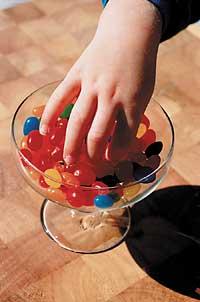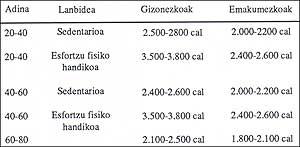Keys to good nutrition
2004/09/01 Agirre, Jabier - Medikua eta OEEko kidea Iturria: Elhuyar aldizkaria

Each person should eat according to their energy needs. The caloric contribution will depend on the expenditure made, taking into account factors such as age, sex, physical activity, biological status, etc. When talking about a balanced diet, you always have to know who this measure of food is aimed at, and do not forget that the older the more calories the person needs.
Daily food should be balanced
The balance between proteins, fats or fats and carbohydrates should be as tight as possible. It is essential to eat everything. Be careful therefore with miraculous diets made with a single ingredient or with few ingredients.
Before starting a meal, ask us if what you are going to eat is appropriate, both in quantity and quality. It is healthier to take adequate amounts less times than to eat too much. Fats are essential for tissues, proteins repair and build tissues and carbohydrates are energy source for muscles. Therefore, none of these ingredients can be missing in our daily diet.
Make a rich and varied diet
You will guarantee your basic nutrition with a varied diet. What you eat should cover the daily needs of trace elements (i.e. vitamins and minerals) and proteins of high biological value. You may want to go hungry, but without food shortages.

You should know the foods to avoid, which contain a lot of saturated fat, such as industrial pastries, snacks, etc. ). It is worth knowing that between 20 and 25% of the total calories of the day should give us breakfast, between 30 and 40% meals and 25% maximum dinners.
Make 5 meals a day
It is ideal to make 3 main meals (breakfast, lunch, dinner) and 2 intermediate supplements (lunch at midmorning and snack). For example, not eating dinner is harmful to health. Between dinner and bedtime you should spend a couple of hours. And before going to bed, take a glass of milk or yogurt to prepare the body for night work.
Breakfast: more important food
Breakfast is much more important than expected and in fact we should take 25% of the total calories of the day at breakfast. It is demonstrated that those who eat breakfast well give more in their work or in their studies than those who eat breakfast poorly or barely.
Healthy breakfast can include everything (cooked ham, turkey, fruit, cereals, milk, etc. ). Do not forget that it is better to eat the whole fruit than the juice, because in addition to taking advantage of the vitamins, we can enjoy all the advantages of fiber and the feeling of satiety will be greater.
Do not forget animal proteins
Animal proteins should be taken at all meals, unlike fats and carbohydrates, as they do not build up in the body. If we don’t have protein, the body will ‘get’ out of the muscles or other organs and malnutrition may appear. And if 50% of its protein content is lost, there is a situation known as ‘biochemical death’, without reversing, even if you try all remedies or solutions.
Vitamins not to run out of energy
Vitamins allow us to extract from food all the energy we need to regain balance and not be tired. The vitamins of group B strengthen the muscles, C, E and beta-carotene (vitamin A) have antioxidant properties and protect the body from free radicals and therefore premature aging, vitamin D allows the absorption of calcium, essential for the care of bones and the prevention of osteoporosis.
What to eat is pleasure for the senses
The possibilities of combining food are very great today and the ways of cooking, which makes food a real pleasure. Make distributed menus and use fertilizers to give a special flavor to what you eat.

They may look like small details, but with a little garlic or onion or with the right spices. In addition, the food is chewed gradually, enjoying the taste. So, in addition, in the stomach you will flow juice and digestion will not be so tiring.
Drinking liquids facilitates digestion
Keep in mind that we should consume at least one milliliter of water for each calorie. So, if we consume between 2,000 and 2,500 calories throughout the day, we should drink 2 liters or 2.5 liters of liquid throughout the day. If you are fed up with drinking water, you can take infusions or milk. But do not forget that water consumption facilitates the process of digestion of food.
Fresh fruit and vegetables
Fruits and vegetables are rich in vitamins, fibers and minerals. Therefore, they are essential in any healthy and balanced diet: they are a source of health and well-being. Being very rich in water, they help eliminate toxins and maintain our hydration state, in addition fiber regulates intestinal work. A pure fruit dinner is very sweet and suitable from a dietary point of view

Gai honi buruzko eduki gehiago
Elhuyarrek garatutako teknologia





